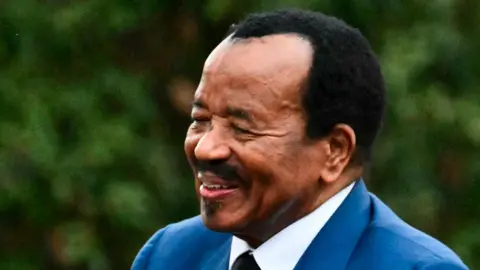Cameroon bans reports on President Biya’s health
 AFP
AFPThe Cameroonian authorities have banned the media from discussing the health of President Paul Biya, following rumours of his death.
Interior Minister Paul Atanga Nji told regional governors that these stories “disturb the tranquillity of Cameroonians”.
“Any debate in the media about the president’s condition is therefore strictly prohibited,” he insisted, threatening that “offenders will face the rigour of the law.”
The 91-year-old leader – in office for more than four decades – has not been seen in public since 8 September, when he attended a China-Africa forum in Beijing.
Several officials have pushed back against speculation around Biya’s condition, insisting he was in good health and on a private stay in Geneva, Switzerland.
Nji said that the health status of the president was a matter of national security and urged governors to create units to ensure the order was being followed by private media outlets and social media.
Many journalists in the country have said they consider the ban a violation of press freedom.
“By saying that mention should not be made of the president’s [health] situation, I find it an infringement on our rights,” a Cameroonian journalist told the BBC on condition of anonymity. He added that “it’s going to really affect the way we report because we’ll certainly not want to run into trouble with government”.
The media restrictions have also raised concerns about the safety of journalists in a country where media professionals are regularly targeted by officials and insurgent groups.
In the past, Anglophone separatists have kidnapped journalists while the government has arrested and detained members of the media.
“I will continue to report even though I fear they could track me down, because there’s no way my report will not talk about the president’s whereabouts or what could be happening to him. I’ll continue to do my job,” another journalist said.
In a statement on Thursday, global press freedom organisation the Committee to Protect Journalists (CPJ) urged the Cameroonian government to “end its threats to sanction private media journalists who report on the condition and whereabouts of President Paul Biya”.
“The health of the president, who has been in power for 41 years and may seek re-election next year, is of public interest. Any misguided attempt to censor reporting about his health for national security reasons simply fuels rampant speculation,” Angela Quintal, head of CPJ’s Africa Programme, stated.
“The Cameroonian government should simply put the rumours to rest by arranging a public appearance by the head of state,” she suggested.
As speculation about the wellbeing of President Biya continues, Cameroonians are highly anticipating his return to the country in the coming days, as promised by the authorities.
You may also be interested in:
 Getty Images/BBC
Getty Images/BBCGo to BBCAfrica.com for more news from the African continent.
Follow us on Twitter @BBCAfrica, on Facebook at BBC Africa or on Instagram at bbcafrica
